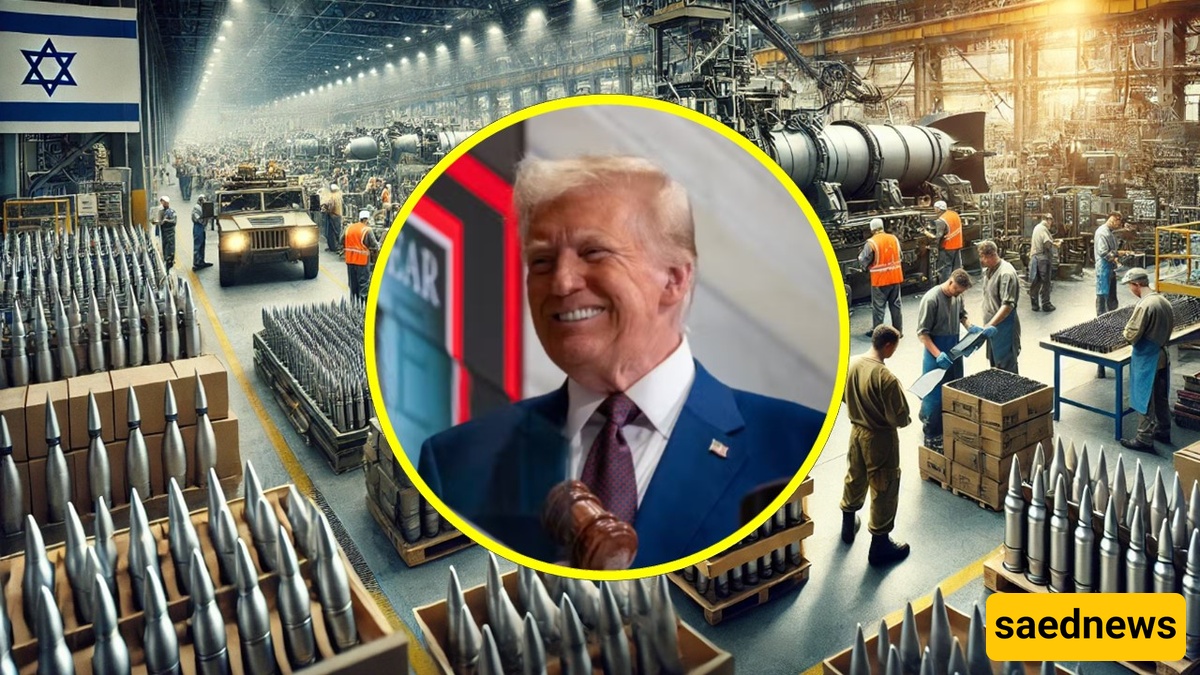SAEDNEWS: At the UN General Assembly, US President Donald Trump demanded an immediate end to the Gaza war while condemning Western recognition of Palestinian statehood as a “reward for Hamas,” in a speech that mixed ceasefire calls with sharp criticism of Iran, the UN, and immigration.

According to Saed News; In a fiery address to the United Nations General Assembly (UNGA) in New York, US President Donald Trump urged world leaders to bring the war in Gaza to an immediate end. While calling for the release of Israeli hostages, Trump denounced recent recognitions of Palestinian statehood by several Western nations, describing them as a dangerous “reward” for Hamas. His remarks sparked controversy, not only for their timing but also for their contradictions—demanding peace while defending Israel’s military campaign and lashing out at international institutions.

Standing before a packed UN chamber, Trump declared:
“We have to stop the war in Gaza immediately.”
The US president claimed to be “deeply engaged” in efforts to secure a ceasefire and pressed for the release of 20 Israeli captives still believed to be alive. Yet, despite his insistence on urgency, critics noted the lack of a clear roadmap. Sultan Barakat, a professor at Hamad Bin Khalifa University in Qatar, observed:
“He knows the main reason the war continues is his administration’s support for Israel.”
Trump’s harshest words were directed at recent moves by several European states to recognize Palestine as an independent state.
“As if to encourage continued conflict, some of this body is seeking to unilaterally recognise the Palestinian state. The rewards would be too great for Hamas terrorists,” he warned.
This position stood in stark contrast to UN Secretary-General António Guterres, who only days earlier insisted that Palestinian statehood was “a right, not a reward.”

Since October 2023, Gaza has been engulfed in war following Hamas’s deadly attack in southern Israel. Negotiations for a ceasefire have repeatedly collapsed. Trump accused Hamas of rejecting “reasonable peace offers,” while largely sparing Israel from criticism.
But Hamas issued a statement denying responsibility, insisting:
“We have never been an obstacle to reaching an agreement. Netanyahu is the sole obstructionist.”
Indeed, Israeli Prime Minister Benjamin Netanyahu has been accused of undermining truce efforts, breaking a March ceasefire, imposing a total blockade, and most recently ordering a new ground invasion of Gaza City. These actions, according to UN investigators, have pushed Gaza into famine, with over 65,000 Palestinians killed since the war began.
Trump’s address also highlighted the ongoing paradox of US policy: calling for peace while arming Israel. The United States continues to face global criticism for supplying weapons used in Israel’s military operations, even as Trump positioned himself as a peace negotiator on the world stage.
Observers say this “two-track” approach—urging an end to violence while enabling it—has weakened Washington’s credibility as a mediator.
Beyond Gaza, Trump turned his focus to Iran, boasting about a recent US military operation.
“Three months ago, in Operation Midnight Hammer, seven American B-2 bombers dropped 30,000-pound bombs on Iran’s nuclear facilities, totally obliterating everything,” he declared.
Yet, a US defense assessment later contradicted Trump’s claim, suggesting the strike had merely delayed Iran’s nuclear progress by several months. The discrepancy underscored the president’s tendency to frame US actions as decisive victories, even when the reality is more complex.
Central to Trump’s Gaza message was the fate of Israeli hostages. “We want all 20 back,” he stressed, uniting his appeal with Israel’s demand for Hamas to release captives.
Hamas, however, linked any release to Israel’s withdrawal from Gaza and the freedom of Palestinian prisoners. The group emphasized it was prepared for a truce that would secure “prisoner exchange, withdrawal of Israeli forces, and lasting calm.” Netanyahu, on the other hand, has consistently rejected a full withdrawal.
The Gaza conflict was only part of Trump’s wide-ranging UN speech. Among his most striking interventions:
On the UN itself: Trump accused the body of failing in its mission. “I had to end wars instead of the United Nations.”
On immigration: He railed against “illegal aliens,” accusing the UN of aiding migration into the US.
On Russia’s war in Ukraine: Trump claimed Moscow’s 2022 invasion “would never have happened” under his watch.
On climate change: He dismissed renewable energy as “the greatest con job.”
Such remarks highlighted the populist-nationalist tone that has defined Trump’s foreign policy—assertive, unilateral, and skeptical of multilateral cooperation.
Trump’s call for an immediate Gaza ceasefire was welcomed by some, including leaders in the Middle East who met with him on the sidelines, such as Egypt’s Abdel Fattah el-Sisi and Turkey’s Recep Tayyip Erdoğan. Erdoğan described their meeting as “very fruitful.”
Yet, others accused Trump of hypocrisy, pointing to the continued US support for Israel’s military campaign. Analysts argue that without addressing Washington’s arms sales and political backing, Trump’s calls for peace risk being perceived as hollow rhetoric.
Trump’s UN address was both dramatic and contradictory. On one hand, he demanded the war in Gaza end immediately; on the other, he justified Israel’s actions and dismissed Palestinian statehood. He celebrated US military strength against Iran while presenting himself as a peacemaker deserving of the Nobel Peace Prize.
Ultimately, Trump’s words captured the paradox of US policy in the Middle East: advocating for peace while perpetuating conflict. Whether his call for an immediate ceasefire will translate into real action—or remain another political performance—remains to be seen.

